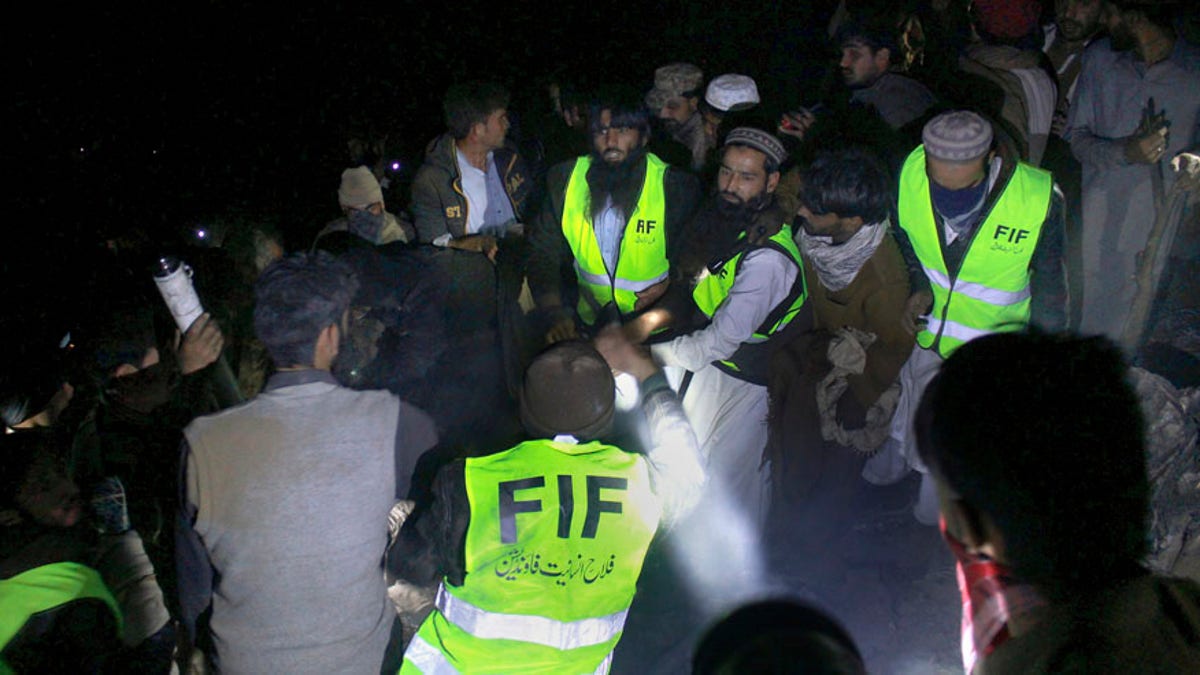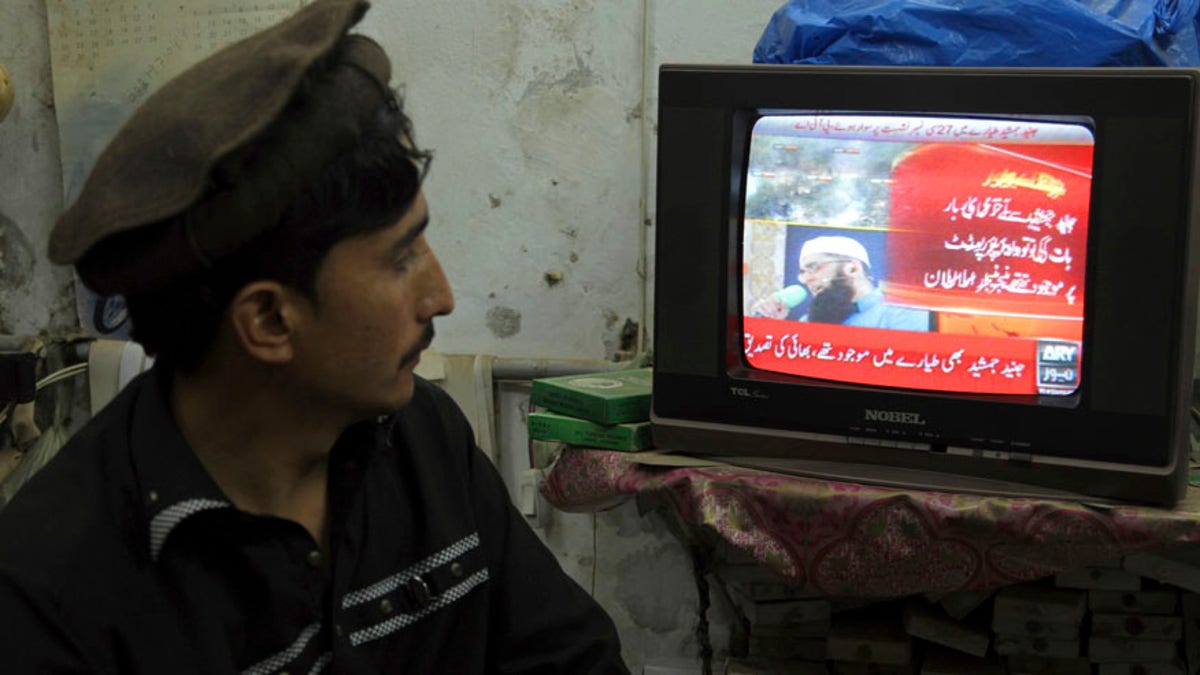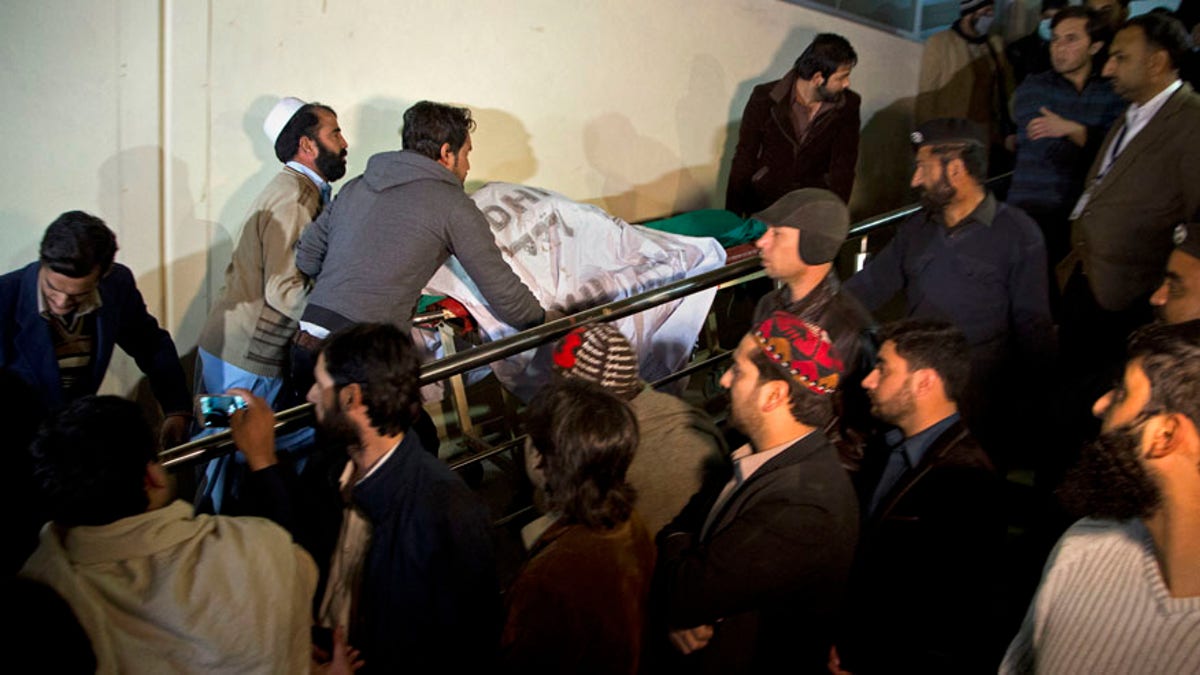
Pakistan army troops and rescue workers collect remains of victims at the site of a plane crash, in a village near the town of Havelian, about 75 kilometers (45 miles) northwest of the capital, Islamabad, Pakistan, Wednesday, Dec. 7, 2016. (AP)
The pilot of the ill-fated Pakistan International Airlines plane that crashed into a mountain on Wednesday killing everyone on board reportedly lost control of one of the engines, the airline chairman said.
Azam Sehgal, PIA’s chairman, told reporters that the pilot for flight PK661 told the control tower at 4:09 p.m. local time that an engine had developed a technical fault and moments later made a “mayday call” shortly before the plane disappeared.
“We were confident that the plane could land with one working engine,” he said, adding: “I think that there was no technical error or human error… obviously there will be a proper investigation.”
The small twin-propeller aircraft was enroute from Chitral to the capital when it crashed near the town of Havelian, about 45 miles northwest of Islamabad. The airline said there were 48 people aboard the plane – 42 passengers, five crew members and one ground engineer.
“There are no survivors, no one has survived,” Sehgal said.
FRANTIC RESCUE EFFORTS IN INDONESIA AS EARTHQUAKE KILLS AT LEAST 97
It was not immediately clear what may have caused the crash.

A Pakistani watches a local news channel broadcasting a report about a passenger plane taking off from Chitral, in the country's north, that crashed near a village near the town of Havelian, at his shop in Lahore, Pakistan, Wednesday, Dec. 7, 2016. The plane belonging to Pakistan's national carrier crashed on Wednesday with about 42 passengers and five crew members and an engineer on board, apparently killing all of them, police and an airline spokesman said. (AP Photo/K.M. Chaudary) (Copyright 2016 The Associated Press. All rights reserved.)
In a statement, the military said that 40 bodies had been retrieved.
Pervez George, the spokesman for the Civil Aviation Authority, told The Associated Press that a team of experts would determine the cause after retrieving the plane's black box recorder.
TV footage showed debris from the plane and a massive fire at the site of the crash. The footage showed local villagers collecting the remains of the passengers and covering the bodies with cloths.
WOMAN KAYAKING WITH SISTER IN HAWAII IS KILLED IN FLASH FLOOD
A spokesman for the Interior Ministry said at team had been dispatched to help identify the bodies through DNA tests. Authorities have released names of passengers — among them Junaid Jamshed, a famous singer-turned-Islamic-preacher.
Among such mourners was tearful Ghulam Rasool Khan, 24, who said his brother Umair Khan was on board the plane.

FILE - In this Dec. 3, 3014 file photo, a vendor shows a DVD of Pakistan's Junaid Jamshed at a stall in Islamabad, Pakistan. A plane belonging to Pakistan's national carrier crashed on Wednesday with about 42 passengers and five crew members and an engineer on board, apparently killing all of them, police and an airline spokesman said on Wednesday, Dec. 7, 2016. Authorities have released names of passengers -- among them Junaid Jamshed, a famous singer-turned-Islamic-preacher. (AP Photo/B.K. Bangash, File). (AP2014)
Ghulam asked police to allow him to identify his brother's body. However, police officer Iqbal Khan told him there was no point in going to the mortuary as, "there is nothing left which you can recognize."
Khan said he had heard that the plane was not fit to fly. "It is a murder and I want to know who killed my brother," he said.
Altaf Hussain, a rescue worker who transported the remains of passengers in an ambulance, told the AP that the crash site smelled of burnt flesh and oil and that body parts were scattered everywhere.
"We collected the burned bones of the ill-fated passengers and wrapped them in cloth," he said.
Ambulance driver Duray Hussain said the remains of the passengers were "beyond recognition."
A spokesman for the Interior Ministry said at team had been dispatched to help identify the bodies through DNA tests. Authorities have released names of passengers — among them Junaid Jamshed, a famous singer-turned-Islamic-preacher.

Pakistani volunteers move remains of plane crash victims to a mortuary at a hospital, in Abbottabad, Pakistan, Wednesday, Dec. 7, 2016. Pakistans national carrier says one of its planes crashed shortly after takeoff from the northern city of Chitral with 48 people aboard. A spokesman for the Interior Ministry said there were no survivors. Rescuers told The Associated Press that the victims bodies were beyond recognition. (AP Photo/B.K. Bangash) (Copyright 2016 The Associated Press. All rights reserved.)
Pakistani Prime Minister Nawaz Sharif expressed his "deep grief and sorrow" over the crash.
In a statement, he said "the entire nation is deeply saddened over today's unfortunate crash and shares the grief of the families who lost their dear ones."
Plane crashes are not uncommon in Pakistan. About 150 people were killed in a crash in the hills of Islamabad in 2010. In 2015, a military helicopter carrying several diplomats also crashed in the country's north, killing eight people. A private plane also crashed near Islamabad due to bad weather in 2012, killing all 127 people on board.
The Associated Press contributed to this report.








































